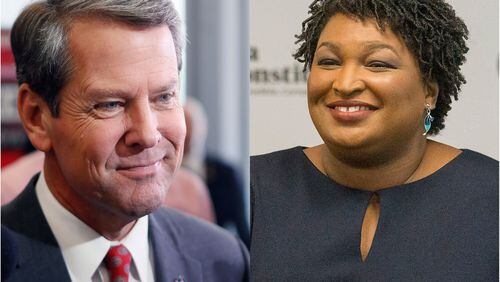Democrat Stacey Abrams, in the final days of her bid for governor, has returned to the case she made at the beginning, that expansion of Medicaid will not only shore up struggling health care systems in Georgia but also create thousands of jobs.
Republican Brian Kemp is closing out his campaign focusing on an economic message, crisscrossing conservative strongholds with Gov. Nathan Deal and other GOP leaders highlighting the number of jobs created over the past decade.
With polls showing the race deadlocked, both their concluding messages highlight a significant shift in Georgia strategy.
Republicans once unleashed scathing attacks at Democrats who struggled to defend the Affordable Care Act. Now, Democrats see support for the law as one of their biggest strengths, and Abrams entered the race a year ago by immediately pledging to expand Medicaid under the ACA.
And Kemp’s emphasis on the economy signals his desire to avoid wading into divisive social issues that intensified over the past week with pipe bombs sent to prominent Democrats across the nation and the massacre of 11 people at a Pittsburgh synagogue.
For Abrams, the call for Medicaid expansion is well-rehearsed. She often devotes vast parts of her campaign speech to making a case that accepting federal funding to allow more people to qualify for government-backed health insurance is a bipartisan issue — and that Republican opposition boils down to one factor.
“It’s because of meanness,” she told the crowd gathered Monday at a church in Warrenton. “Because they’re too mean to help Georgians. And if you’re too mean to help Georgians, you are not entitled to be in charge of the state of Georgia.”
Abrams likes to point out that other Republican-led states have expanded Medicaid, including John Kasich's Ohio and Indiana, where Vice President Mike Pence once governed. Georgia is among 14 states that have not, rejecting billions of federal dollars in the process.
“John Kasich said it was the moral thing to do,” she said. “So it’s not because of morals and it’s not because of money and it’s not because of partisanship. What is it?”
The polls show a shift in support for the program. In a January poll conducted by The Atlanta Journal-Constitution, 73 percent of Georgians said they were in favor of Medicaid expansion. Even a slight majority of Republicans — 51 percent — supported it.
Even if Abrams wins, she won’t be able to expand Medicaid on her own. Republican lawmakers took that decision out of the governor’s hands — giving it to themselves — when Deal was running for re-election in 2014 against Democrat Jason Carter. The GOP is expected to maintain control of the General Assembly after the election.
Expansion has met a wall of opposition from Deal, Kemp and other Republicans who have long opposed it, saying it would be too costly in the long run.
Estimates range from $246 million to $468 million in state dollars would be required each year to provide Medicaid to 473,000 uninsured people. The state would also qualify for about $3 billion in federal funding.
For months, Kemp’s health care plan centered on his opposition to Medicaid expansion with little other detail. But a few weeks ago, he added more nuance to his policy, proposing to boost the rural hospital tax credit program and seek federal waivers to help stabilize insurance premiums.
In a joint interview Monday, Kemp and Deal amplified their criticism of an expansion.
Kemp said more Georgians would oppose enlarging the program if they had more details about the long-term costs. He said Abrams would inevitably support a single-payer health care system — something she hasn’t endorsed in her campaign — that would drive up taxes for Georgians.
He called it a “radical government takeover of health care” that would ultimately lead to higher taxes.
And the governor cast it as a fundamental ideological divide. He said the state’s economy would suffer irrevocable harm by expanding the program that now covers children, the elderly and people with disabilities to include low-income adults.
“The expansion of Medicaid would give free health care to able-bodied Georgians. That’s contrary to what we’ve tried to do: create jobs for Georgians,” Deal said. “If you take the focus off job creation, and jobs that will carry health insurance, you shift that responsibility. And I think that’s wrong.”
Kemp's closing message largely avoids an overt focus on health care, aside from promises to lower health care insurance premiums and expand a rural hospital tax credit.
Instead, at one stop after another, Kemp and Deal talked about the more than 700,000 jobs created over the past eight years. The governor took aim at Abrams’ initial proposal to reverse state income tax cuts approved this year; she has since said she would not seek to reinstate those taxes.
“Why would anyone want to change course? Why would anyone want to go back? Why would anyone want to take your tax cuts back?” Deal said. “The people on the other side want to do all of that. And it makes no sense.”
During a swing through east Georgia, Abrams countered with her own economic response. Speaking to a crowd in Warrenton, she said embracing the law would create 3,000 jobs in east Georgia and 53,000 more statewide.
Then she brought her argument home: There would be 300 people in Warren County who would get health care who now have no federal coverage.
“Three hundred people who risk losing their jobs,” she said, “because when they have a moment, when they have an episode they can’t get any help.”
OUR REPORTING
It's a busy election year, and The Atlanta Journal-Constitution is keeping the spotlight on the leading candidates for governor, Republican Brian Kemp and Democrat Stacey Abrams. Recent AJC stories have examined Kemp's finances and Abrams' position while in the state Legislature as a leading collector of per diem. Look for more at ajc.com/politics as the state heads for the general election on Nov. 6.









